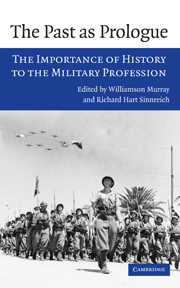Book contents
- Frontmatter
- Contents
- Contributors
- 1 Introduction
- 2 Military history and the history of war
- Part I The influence of history on the military profession
- Part II The past as illuminator of the future
- 7 Thucydides as educator
- 8 Clausewitz, history, and the future strategic world
- 9 History and the nature of strategy
- 10 Military transformation in long periods of peace: the Victorian Royal Navy
- 11 Military history and the pathology of lessons learned: the Russo-Japanese War, a case study
- 12 Obstacles to innovation and readiness: the British Army's experience, 1918–1939
- 13 What history suggests about terrorism and its future
- 14 History and future of civil–military relations: bridging the gaps
- Index
9 - History and the nature of strategy
Published online by Cambridge University Press: 05 June 2012
- Frontmatter
- Contents
- Contributors
- 1 Introduction
- 2 Military history and the history of war
- Part I The influence of history on the military profession
- Part II The past as illuminator of the future
- 7 Thucydides as educator
- 8 Clausewitz, history, and the future strategic world
- 9 History and the nature of strategy
- 10 Military transformation in long periods of peace: the Victorian Royal Navy
- 11 Military history and the pathology of lessons learned: the Russo-Japanese War, a case study
- 12 Obstacles to innovation and readiness: the British Army's experience, 1918–1939
- 13 What history suggests about terrorism and its future
- 14 History and future of civil–military relations: bridging the gaps
- Index
Summary
To ask one question of an historian commonly elicits another by way of response. So it is with the question as to what we can learn from history about the nature of strategy, to which academic historians of the general sort will in most cases reply: “What can we learn from history about anything?” Many, perhaps most, of them maintain that there are no “lessons” that one can distil from the past. While this is not the most helpful of standpoints for those in search of practical guidance, it is worth spending a moment on the drawbacks of history as a suggestive discipline both to understand history's limitations and appreciate what it might do in providing enlightenment about the military dimensions of the past and their relationships with the present.
The discipline of history shares some of the characteristics of science, but not those that would obviously be of most value when crossing the border between understanding the past and offering advice or guidance on the future. For the most part, strategists have presented their subject as a science, and history does share some of the foundations of science in that it, too, is a body of knowledge based on the facts of experience, so strategy and history might appear to enjoy a close degree of kinship.
At once, however, problems of which the scholar is all too well aware, but which some strategic writers of the past dismiss or disregard, begin to crowd in.
- Type
- Chapter
- Information
- The Past as PrologueThe Importance of History to the Military Profession, pp. 133 - 149Publisher: Cambridge University PressPrint publication year: 2006



